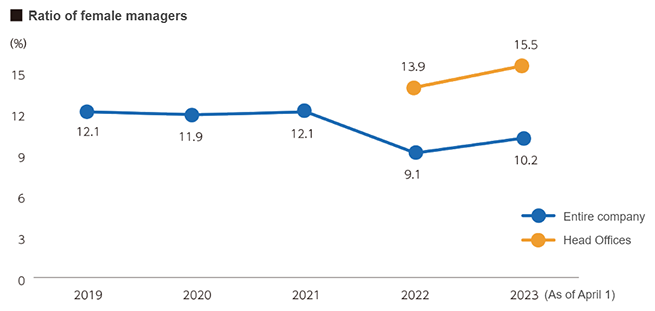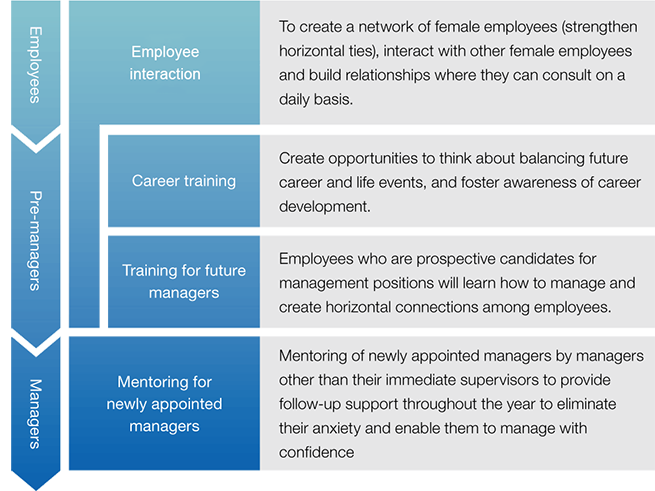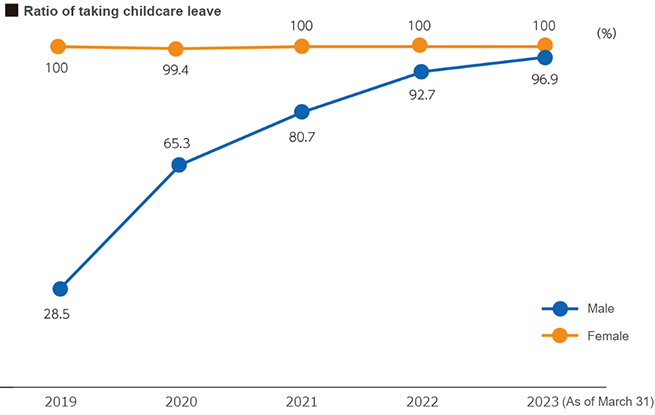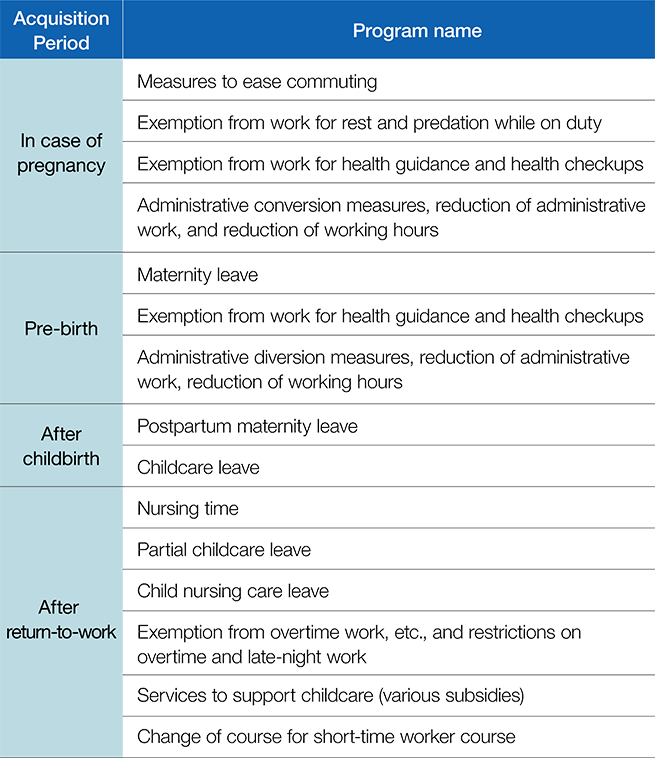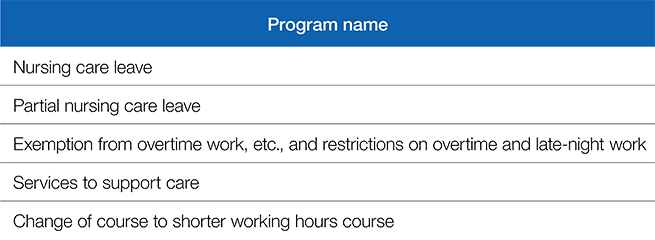Promoting Diversity and Flexible Work Styles
Based on "3. Promote the active participation of diverse human resources and flexible work styles" of our "Three Basic Principles of Human Capital Management", we are committed to creating a diverse and vibrant organization, respecting the human rights of all people involved in our business activities, ensuring a safe and comfortable work environment, and creating a rich workplace where individual employees can exercise their independence and creativity.
<Three Basic Principles of Human Capital Management>
- Establish a corporate culture in which employees act independently
- Secure human resources in a strategic manner
- Promote the active participation of diverse human resources and flexible work styles
- *
- For our Health and Safety and Health Management initiatives, please refer to here.
Promoting Expanding Roles of Female Employees
The company will support more female employees so that they can be active in various workplaces and positions.
Appointment of Female Managers
Our goal is to increase the ratio of female managers at the head offices (including Services Centers) to 30% or more by April 1, 2031. We provide training for female employees who are expected to play an active role as managers in the future. The aim is to foster awareness of promotion to management positions, and enabling employees to gain skills.
- *
- FY2022 fell significantly in comparison to FY2021 due to the increase in the number of employees assigned to Japan Post Insurance from Japan Post Co., Ltd. in conjunction with the shift to the new Japan Post Insurance sales system.
Partial amendments have been made to the calculation procedures from FY2023 (excluding the employees assigned from other companies and including those assigned from the Company to other companies).
Partial amendments have been made to the calculation procedures from FY2025/3 (the scope of head office functions has been expanded due to organizational reform, etc.).
Initiatives to raise employee awareness
【Information about Role Models】
To encourage employees to think about their own careers, we have introduced various career plans and employee ideas in the company internal newsletter.
We also have Kampo Junction that introduces the stories of our employees who are active in the Company.
【Understanding Unconscious Bias】
We conduct Unconscious Bias seminars to help employees understand their own unconscious tendencies to prejudge and prejudice. We believe that understanding our own tendencies will help us to accept diverse opinions and provide an opportunity to expand and develop the range of our thinking.
【Survey for all employees on their willingness to be promoted】
We conduct the survey for all employees regarding their willingness to be promoted. Based on the results of the survey, we are implementing measures to resolve the issue.
Employee Development and Networking for Female Employees
We are working on systematic and continuous development of female employees by providing opportunities for employee interaction and training for pre-managers.
External Activities
"Declaration on Action" by a group of male leaders who will create "A Society in which Women Shine"
Japan Post Insurance has endorsed the "Declaration on Action" by a group of male leaders who will create "A Society in which Women Shine," which is supported by the Gender Equality Bureau, Cabinet Office, and takes part in the General Meeting.
(Reference) A group of male leaders who will create "A Society in which Women Shine"
On March 28, 2014, a kick off meeting to create "a society in which women shine" was held at the office of the Prime Minister in order to create a nationwide movement to support women who will and do shine in various fields.
In succession to this, male leaders who have already been involved in promoting an active role of women in their own organization were invited to discuss the role of male leaders in Japan and "Declaration on Action" by a group of male leaders who will create "A society in which Women Shine" was announced.
Other
Our efforts were listed as good examples in the Cabinet Office Gender Equality Bureau's FY2023 Case Studies for the Acceleration of Women's Advancement.
(Reference) FY2023 Case Studies for the Acceleration of Women's Advancement
This is a compilation of the results of a survey that the Cabinet Office Gender Equality Bureau conducted of companies listed on the Tokyo Stock Exchange Prime Market, regarding the positive effects of increasing women's advancement and good examples of companies that have promoted women's advancement."
Support for Balancing Work with Childcare and Nursing Care
Our goal is to increase the percentage of both male and female employees taking childcare leave to 100% by the fiscal year 2025.
In the fiscal year 2023, the rate of taking paid childcare leave reached 100% among eligible male and female employees, and we are working to thoroughly implement the return-to-work support program for employees who have taken childcare leave and holding seminars to help employees achieve a balance between work and childcare to maintain a 100% uptake rate.
Additionally, We received "Platinum Kurumin" certification from the Ministry of Health, Labour and Welfare in recognition of these initiatives in the fiscal year 2018. Also, we were selected as a "Next Nadeshiko: Companies Supporting Dual-career and Co-parenting" by the Ministry of Economy, Trade and Industry and the Tokyo Stock Exchange.
Childcare-related Systems
Click on the image to open the zoom-in version in a new window.
Support for Balancing Work and Childcare
| Measure | Programs of the Japan Post Group | |||||
|---|---|---|---|---|---|---|
| Regular employees | Rehired elderly employees | Associate employees Fixed-term employees |
||||
| Time | Wages | Time | Wages | Time | Wages | |
| Childcare leave | Until the child is 3 | No(※1) | Until the child is 3 | No(※1) | Associate employees: until the child is 3 Fixed-term employees: until the child is 1 |
No |
| Partial childcare leave | Until the end of the fiscal year in which the child reaches the age of 9(※2) | No | Until the end of the fiscal year in which the child reaches the age of 9(※2) | No | Until the end of the fiscal year in which the child reaches the age of 9(※2) | No |
| Time for childcare(※3) | 2x per day, 45 min. each | Yes | 2x per day, 45 min. each | Yes | 2x per day, 30 min. each | No |
| Sick/injured childcare leave(※4) | Up to 5 days (10 days if 2 or more children) |
Yes | Up to 5 days (10 days if 2 or more children) |
Yes | Up to 5 days (10 days if 2 or more children) |
No |
| Exemption from overtime work or work during weekly days off | Until child(ren) start(s) elementary school | - | Until child(ren) start(s) elementary school | - | Until child(ren) start(s) elementary school | - |
| Restrictions to overtime work | Within 24 hours per month Within 150 hours per year |
- | Within 24 hours per month Within 150 hours per year |
- | Within 24 hours per month Within 150 hours per year |
- |
| Exemption from late-night work, etc. | Until child(ren) start(s) elementary school | - | Until child(ren) start(s) elementary school | - | Until child(ren) start(s) elementary school | - |
| Change to work schedule with shorter working hours | Available | - | - | - | - | - |
| Rehiring of retired employees | Available | - | - | - | - | - |
- (*1)
- Employees can take childcare leave regardless of gender. The first three days of childcare leave will be paid, up to the day following eight weeks calculated from the date of the child's birth or the expected date of the child's birth, whichever is later.
- (*2)
- In the case of a child with disability or chronic illness, until the end of the fiscal year in which chiledren reach the age of 12
- (*3)
- Employees can take "childcare leave" for childcare purposes, such as breastfeeding and taking their child to and from daycare until the child reaches the age of one.
- (*4)
- This applies only to children who reach the age of 9 and are between now and the first March 31st after that date (children who have not yet completed the third grade of elementary school).
- (*)
- The table above presupposes that employees work 8 hours per day.
On-site Daycare Center
In April 2019, the Japan Post Group opened an on-site daycare center, Yutemachi Nursery, in the Otemachi Head Office building.
Promotion of Childcare Leave
From May 2023, we have made it mandatory for employees to take paid childcare leave.
(Employees who have not taken leave before or after childbirth must take the first three days of childcare leave (paid) within eight weeks and one day from the date on which the child is born or the expected date of childbirth, whichever comes later.)
Promotion of Male Participation in Childcare
We encourage employees who are expecting a child to take childcare leave. In addition, we encourage employees to participate in childcare by using the Childcare Leave Guidebook for Dads.
Nursing Care Related Systems
Click on the image to open the zoom-in version in a new window.
Support for Balancing Work and Nursing Care
| Measure | Programs of the Japan Post Group | |||||
|---|---|---|---|---|---|---|
| Regular employees | Rehired elderly employees | Associate employees Fixed-term employees |
||||
| Time | Wages | Time | Wages | Time | Wages | |
| Nursing care leave | 183 days in total (continuous or intermittent) |
No | 183 days in total (continuous or intermittent) |
No | Associate employees: 183 days in total Fixed-term employees: 93 days in total (continuous or intermittent) |
No |
| Partial nursing care leave | 3 years (continuous or intermittent) |
No | 3 years (continuous or intermittent) |
No | 3 years (continuous or intermittent) |
No |
| Days off for nursing care | Up to 5 days (10 days if caring for 2 or more people) |
No | Up to 5 days (10 days if caring for 2 or more people) |
No | Up to 5 days (10 days if caring for 2 or more people) |
No |
| Exemption from overtime work or work during weekly days off | While caring for a family member who requires nursing care | - | While caring for a family member who requires nursing care | - | While caring for a family member who requires nursing care | - |
| Restrictions to overtime work | Within 24 hours per month Within 150 hours per year |
- | Within 24 hours per month Within 150 hours per year |
- | Within 24 hours per month Within 150 hours per year |
- |
| Exemption from late-night work | While caring for a family member who requires nursing care | - | While caring for a family member who requires nursing care | - | While caring for a family member who requires nursing care | - |
| Change to work schedule with shorter working hours | Available | - | - | - | - | - |
| Rehiring of retired employees | Available | - | - | - | - | - |
(*)The table above presupposes that employees work 8 hours per day.
Training and Seminars
【Seminars on childcare】
In order to facilitate a smooth return-to-work, we hold seminars for employees who are raising children, in which couples can participate.
【Seminars on nursing care】
We hold training on internal and external systems related to nursing care.
In addition to this, an e-learning environment has been created to allow for self-improvement during childcare or nursing care leave.
Work-Life Balance Guidebook
We post the Work-Life Balance Guidebook, which describes various support systems for childcare and nursing care, on the company portal site. We have also established the Work-Life Balance Information Website to provide a place for Group employees to exchange information.
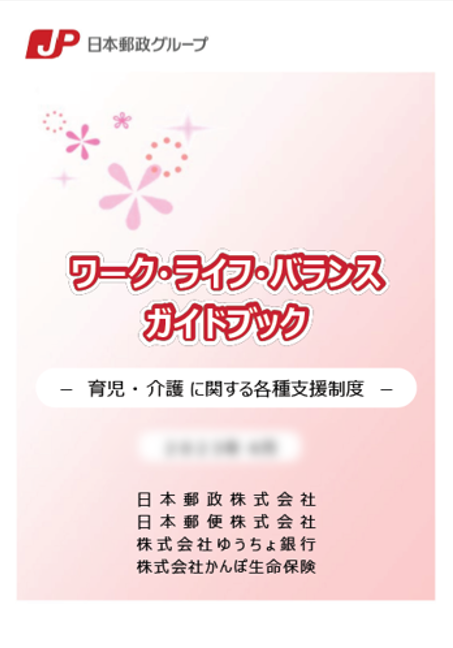
External Evaluation and Support for Initiatives
External Evaluation
In March 2024, we were selected as a "Next Nadeshiko: Companies Supporting Dual-career and Co-parenting" by the Ministry of Economy, Trade and Industry and the Tokyo Stock Exchange. The "Next Nadeshiko: Companies Supporting Dual-career and Co-parenting" is an award selected companies that are particularly outstanding in their efforts related to "support for all employees to manage to strike a balance between empowerment in the workplace and child rearing (i.e. dual-career and co-parenting)."

We have received Kurumin Certification from the Ministry of Health, Labour and Welfare since 2015, and acquired Platinum Kurumin Certification in March 2019. The Platinum Kurumin Certification system recognizes companies that are pursuing initiatives at an advanced level among companies that have received Kurumin Certification as childcare support companies.
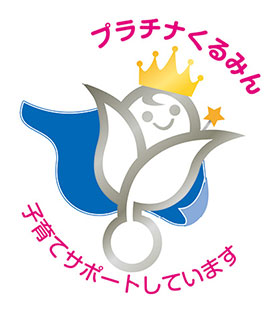
As a company that promotes the establishment of a work environment which accommodates
both work and nursing care for family members, the prevention of voluntary resignation due to nursing care for family members, and support toward reinstating employment, we have received the symbol mark "Tomonin" set up by the Ministry of Health, Labour and Welfare.
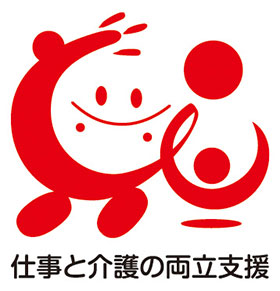
Support for Initiatives
IkuBoss Corporate Alliance
In 2017, we became a member of the IkuBoss corporate alliance and have been actively raising the awareness of managers, considering the work-life balance of their subordinates, supporting their careers and lives, and fostering bosses who can enjoy their own work and personal lives while achieving results for the organization. In addition to fostering IkuBoss, we aim to achieve a 100% rate of male employees taking childcare leave.
[WEPs]
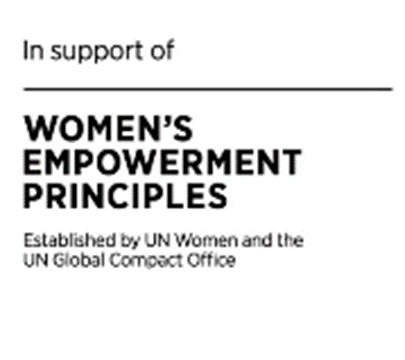
In 2022, we declared our support for the Women's Empowerment Principles (WEPs).
The WEPs consist of seven international principles to promote women's economic empowerment to encourage vigorous corporate activity and growth through autonomous corporate initiatives, positioning gender equality and women's empowerment at the core of management.
Hiring a Diverse Workforce
Employment of People with Disabilities
The Japan Post Group's goal is to increase the percentage of employment rate of people with disabilities to 3.0% or more by March 31, 2026.
We actively promote the employment of people with disabilities recognizing that fairly evaluating and providing work opportunities for a diverse population is a part of our corporate social responsibility. In addition, we are promoting measures such as establishing a dedicated consultation service for employees with disabilities and providing opportunities for dialogue, thereby supporting the retention of employees with disabilities in the workplace.
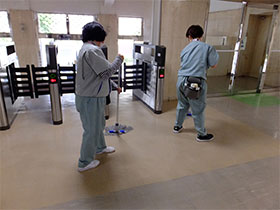
Administrative Support Team and Cafe Team from Diversity Promotion Office
The Diversity Promotion Office is staffed by employees with disabilities who provide administrative support and run the Company's in-house cafe. The Administrative Support Team takes care of regular tasks that arise in various departments, such as delivering mail, refilling photocopiers with paper, and disposing of shredded garbage, thereby lending a helping hand to "scratch the itch" of other teams. The Cafe Team sells beverages such as coffee and tea, as well as freshly baked bread and other refreshments to spread "smiles and deliciousness" to employees.
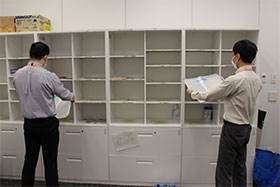
Preparing mail for delivery to other departments

Preparing to sell bread
Acceptance of Trainees
The Diversity Promotion Office regularly receives trainees from special support schools. The Company has prepared a practical program with which to support students who are considering taking up employment at a company, allowing them to not only experience actual work for a prescribed period of time alongside members of the Administrative Support Team and Cafe Team, but also to participate in morning and closing assemblies and practice thorough workplace etiquette such as giving and receiving greetings.
Contribution of the Formation of a Diverse Society through Support for Wheelchair Tennis
As a top partner of the Japan Wheelchair Tennis Association, we support wheelchair tennis.
In addition, to contribute further support, we welcomed OHTANI Momoko, a wheelchair tennis player, as a full-time company employee in FY2020. We support her activities and communicate to society how she continues to challenge herself to achieve her dreams.
Elderly Reemployment System
In accordance with the Act on Stabilization of Employment of Elderly Persons, the mandatory retirement age for employees has been set at 65.
Recruitment in various areas in Japan
We employ career-track positions in all areas of the country, as well as area core positions and general positions in each area.
LGBT Friendly
We are conducting training to deepen the understanding of polymorphous sexuality and promoting the expansion of allies who understand and support LGBTQ+*, aiming to become a LGBT friendly company. We continue to create a working environment in which all employees can develop their talents, so that they can work with energy and vitality.
- (*)
- The first letters of the four words L (lesbian), G (gay), B (bisexual), and T (transgender) are arranged, and Q (questioning and queer) is added to "+" to signify diversity outside of the existing framework.
Policy
The Japan Post Insurance Human Rights Policy clearly states, "The Company does not discriminate based on race, color, gender, sexual orientation, gender identity, language, religion, politics, creed, nationality, ethnicity, age, social origin, poverty or wealth, birth, disability, etc."
Personnel System
In the company regulations, the term "spouse" for bereavement leave and marriage leave is clearly defined as "including those who are in a so-called common-law relationship and those who have a notarized agreement contract for joint life (a certificate of partnership issued by the local government, if any).
Support for Initiatives
We support Tokyo Rainbow Pride* every year.
- (*)
- A celebration of sexual and life diversity organized by Tokyo Rainbow Pride, a non-profit organization.
External Indicators
For seven consecutive years, we were awarded Gold in the PRIDE INDEX*.
- (*)
- The voluntary organization "work with Pride" established in 2016 as Japan's first evaluation index for LGBTQ+ initiatives in the workplace.

Trademark Registration of Symbol Mark
In FY2020, as an LGBT-friendly insurance company, we have registered this trademark as a symbol of our efforts to promote the sharing of appropriate understanding and knowledge of LGBT issues.

Our trademarked LGBT ALLY logo
Promoting Flexible Work Styles
Diversifying Ways of Working
We have established an environment in which employees can choose from among a variety of work styles, including shortened working hours, flextime, and re-employment.
Promoting Telework
We strive to improve operations and productivity via telework. We also strive for employee well-being. To implement telework more effectively, we continue to improve the telework environment through paperless work, using communication tools, more flexibility training and the adoption of cloud storage services to cope with the increase in data volume. In these ways and more, we strive to break away from work flows based on the premise of physical office attendance.
External Indicators
As a company with ample results, among all companies and organizations that have introduced or utilize teleworking, we were certified among the "Top Hundred Telework Pioneers" by the Ministry for Internal Affairs and Communications.


